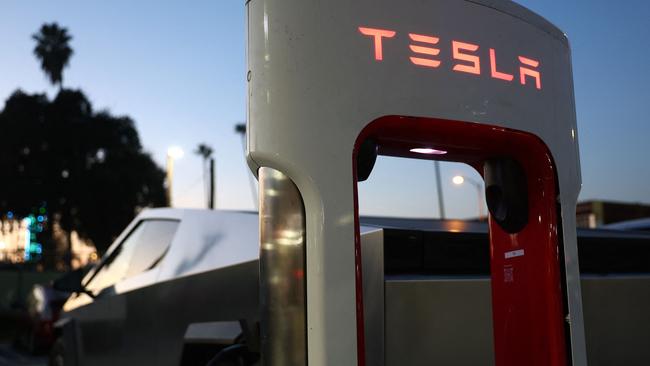UniSuper’s Global Environmental Opportunities Fund stumbles on Trump climate fears
The nation’s ‘greenest’ super fund, run by the $140bn UniSuper, was one of the industry’s worst performers in 2024, despite a hefty allocation to listed equities.

Business
Don't miss out on the headlines from Business. Followed categories will be added to My News.
The nation’s ‘greenest’ super fund, run by the $140bn megafund UniSuper, is also one of the industry’s worst performers for 2024, clocking up a negative return for the third year in a row – and it may only get worse from here.
UniSuper’s Global Environmental Opportunities Fund returned negative 3.1 per cent for the 12 months through to the end of December, despite being almost exclusively invested in global listed markets, with a hefty allocation to US equities including Tesla.
The fund has put the blame for the latest dismal performance squarely on Donald Trump’s election win, adding that despite Tesla’s gains – the stock rallied 90 per cent through the year, with most of this post the November US election – this was offset by losses in other parts of the portfolio.
“Returns were impacted by the US election result which raised uncertainty about the speed of the energy transition,” a Unisuper spokesperson told The Australian.
“While the Tesla holding performed strongly, other EV and battery manufacturers and solar and wind power companies underperformed,” the spokesperson added.
But with the new US president, who has Tesla CEO Elon Musk by his side in his new administration, already vowing to roll back climate policies, pull the US out of the Paris climate agreement and promote fossil fuels, the fund’s returns could be in for another hit in the near term.
The Global Environmental Opportunities Fund, which has 95 per cent of its assets invested in international shares, and almost half of this in US equities, has a much more restricted investment universe than its sustainability-focused peers: to qualify, a company must derive at least 40 per cent of its reported business revenues from one or more environmental market sectors.
The ultra-green fund fared much worse than UniSuper’s other green option, its sustainable balanced fund, which returned 15 per cent over 2024 to be the second-best performing fund in the category for the year, according to SuperRatings.
UniSuper, with $140bn in assets under management, primarily looks after the retirement savings of the nation’s academics, scientists and researchers and opened to the public four years ago.
Some of its more environmentally focused members now find themselves caught out by the ultra high-risk strategy, which has 37 per cent of its listed holdings concentrated in just 10 stocks.
From assets under management of $2.5bn in mid-2023, the Global Environmental Opportunities Fund, which is highly concentrated with fewer than 100 stocks, has lost $1bn of its value through a mix of poor performance and members yanking out their funds.
Just weeks before the US election, UniSuper chief investment officer John Pearce was sounding a note of optimism to members in the strategy.
“The option has benefited from cuts in interest rates in both the US and China. It’s also benefited from the fact that valuations became quite depressed.
“Finally, the prospect of Kamala Harris becoming president of the US is positive for the renewable sector, and that, of course, would be positive for GEO,” he said in a market update.
Mr Pearce previously warned that President Trump’s motto of “drill, baby, drill” would “not be good” for the renewable energy sector.
The Global Environmental Opportunities Fund has been around for more than a decade and is a highly volatile strategy – it saw a 50 per cent gain in 2021 alone.
The bulk of the companies it invests in are involved in either renewable energy or electric vehicles and its components such as batteries. Tesla is its biggest holding, at 7 per cent of the portfolio, according to the latest publicly available data.
But the fund significantly sold down its position between mid-2023 and mid-2024.
At the start of the 2023/24 financial year, Tesla accounted for 9.4 per cent of the fund’s assets, with 614,000 of the EV maker’s shares valued at about $241m.
But a year later, the fund had sold off 40 per cent of the holding, leaving it with 356,000 shares valued at $105m.
UniSuper’s Pearce has previously cautioned members that the fund “is a specialised, concentrated option” and so will be more volatile than the general market.
More Coverage
Originally published as UniSuper’s Global Environmental Opportunities Fund stumbles on Trump climate fears





